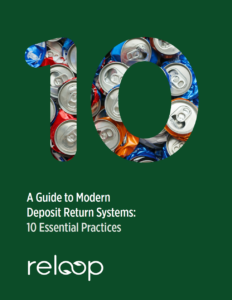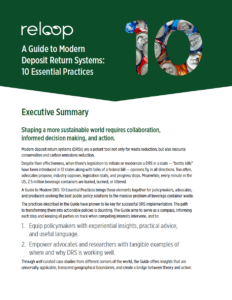A Guide to Modern
Deposit Return Systems:
10 Essential Practices
Shaping a more sustainable world requires collaboration, informed decision making, and action.
Modern deposit return systems (DRSs) are a potent tool not only for waste reduction, but also resource conservation and carbon emissions reduction.
Despite their effectiveness, when there’s legislation to initiate or modernize a DRS in a state — “bottle bills” have been introduced in 12 states along with talks of a federal bill — opinions fly in all directions. Too often, advocates propose, industry opposes, legislation stalls, and progress stops.
Our guide can help
-

A Guide to Modern Deposit Return Systems: 10 Essential Practices
10 key requirements for successful implementation of a DRS to serve as a roadmap for policymakers, advocates, and producers seeking the best public policy solutions.
-

A Guide to Modern Deposit Return Systems: 10 Essential Practices Executive Summary
Short summary of the 10 key requirements for successful implementation of a DRS to serve as a roadmap for policymakers, advocates, and producers seeking the best public policy solutions.
-

Redemption Podcast
Redemption is a podcast dedicated to exploring A Guide to Modern Deposit Return Systems: 10 Essential Practices.
A Guide to Modern DRS: 10 Essential Practices brings all the elements together for policymakers, advocates, and producers seeking the best public policy solutions to the massive problem of beverage container waste.
The 10 practices
The practices described in the Guide have proven to be key for successful DRS implementation. The path to transforming them into actionable policies is daunting. The Guide aims to serve as a compass, informing each step and keeping all parties on track when competing interests intervene, and to:
- Equip policymakers with experiential insights, practical advice, and useful language.
- Empower advocates and researchers with tangible examples of where and why DRS is working well.
Through well curated case studies from different corners of the world, the Guide offers insights that are universally applicable, transcend geographical boundaries, and create a bridge between theory and action.

Practice 1
Meaningful Targets and Penalties
The foundation of a successful DRS lies in achieving meaningful targets which drives proactive participation from all the stakeholders involved. Complementing such targets are enforceable penalties, whose importance and application are detailed in this section.

Practice 2
Point-of-Return
Recycling success hinges on public participation. This practice underscores the value of informed and engaged consumers, catalyzing their active involvement in the DRS. Centering DRS on equity and access can lead to higher return volumes compared with examples of when these elements aren’t included. This section expands on the legislative requirements for high performance and accessibility.

Practice 3
Compliance and Official Reporting
Transparency and accountability serve as the cornerstones of an effective DRS. This practice showcases the importance of well-structured reporting mechanisms, binding legal frameworks, and robust compliance protocols.

Practice 4
Oversight and Enforcement
Effective DRS implementation demands vigilant oversight and rigorous enforcement. Practice 4 navigates through the intricacies of monitoring, addressing fraudulent activities, and ensuring system integrity.

Practice 5
Design, Marking, and Registration for Containers
This practice delves into the significance of standardized container design, universally recognizable markings, and rigorous registration systems. These measures not only enhance sorting accuracy but also enable consumers to recycle easily.

Practice 6
Collection
Access to convenient collection points is pivotal in motivating consumer participation. This practice explores the role of retailers and highlights the minimum standards and operating requirements as well as the technological needs of an efficient DRS.

Practice 7
Infrastructure for Large-Volume Returns
This practice focuses on the pivotal role of optimized logistics in orchestrating large-volume returns. By explaining the various methods of collection, this practice highlights the specific operational requirements that ensure successful DRS implementation and financial viability.

Practice 8
Optimized Logistics
To enable a DRS to recycle efficiently, efficient logistics are paramount. This section delves into optimizing logistical operations, balancing flexibility with performance requirements.

Practice 9
Material Processing and Service Fees
This practice unpacks the intricacies of handling and processing fees, emphasizing transparency and accuracy in financial transactions to show how these mechanisms maintain DRS momentum.

Practice 10
Management of Material Flow and Financial Data
This practice elaborates on the roles of regulatory agencies, producers, and distributors in maintaining transparent transactions.
Reloop North America works to inform, develop and promote well-drafted policies that will lead to high-performing circular collection systems for packaging.
About Reloop North America
A dual-action approach delivering critical benefits for the climate, the environment and for business – adopted by the EU and recommended globally.

Our comprehensive overview of Deposit Return Systems for Single-Use Beverage Containers.

Drawing on data from 93 countries, over a 20 year period, examining trends in sales, collection and wastage of drinks containers.